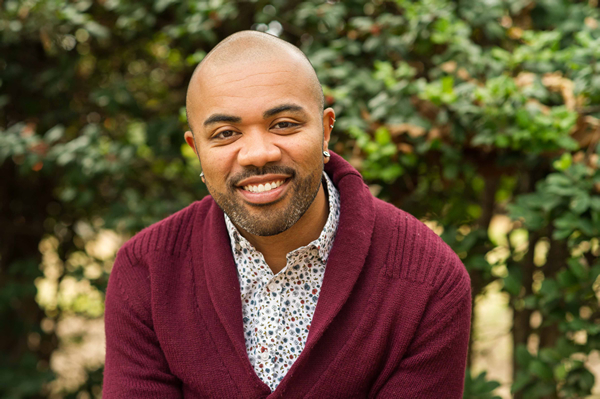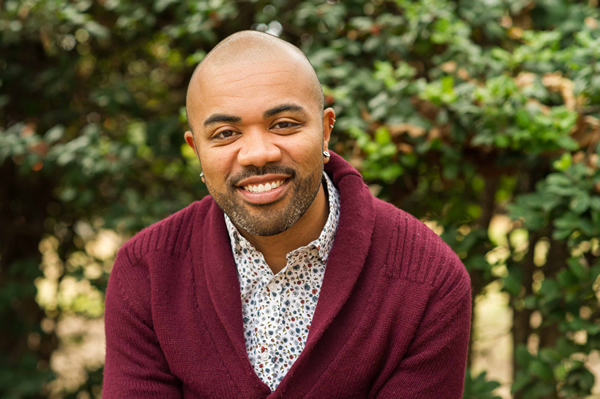
Raymond O. Caldwell is the producing artistic director of Theater Alliance.
‘City in Transition: The Quadrant Series’
Streaming from April 24-May 24
Theater Alliance
Recently, a Facebook post asked “Are there any activist theaters in D.C.?” A local actor quickly replied. “There’s only one,” she wrote. “It’s Theater Alliance.”
During a phone interview from his home in Anacostia last week, Theater Alliance’s producing artistic director Raymond O. Caldwell, addressed the social media query: “We keep our heads down and do the work. Well before the pandemic, we were trying to have conversations about race in America. Then it seemed niche work. Now that work is in vogue. There might come a time when it’s no longer stylish. But that’s OK, we’re ultimately doing it to transform people’s lives and start conversations.
“Our plays won’t change the world. Straight up. But we can start conversations that are uncomfortable and don’t have easy answers. And by partnering our productions with various nonprofits, we’re able to involve people in the movement whether it’s on the front line or stuffing envelopes.”
In residence at Anacostia Playhouse, Theater Alliance’s mission is to illuminate the experiences, philosophies, and interests of D.C.’s diverse population. When Caldwell, who is gay, took helm of the company in January 2019, the organization was already steeped in diversity. He’s worked to continue and expand on that, creating a cultural institution that’s invited in the surrounding, mostly Black community.
The company kicked off its virtual season in December with eight pieces about protest centered around the demands of the Black Lives Matter movement. Having started off nationally, they’re now moving locally with “City in Transition: The Quadrant Series,” a 90-minute intersection of theater and film directed by Caldwell.
Part of the multi-Helen Hayes Award-winning company’s Hothouse new play development series, “City in Transition” consists of four filmed plays about Washington’s quadrants, SE, SW, NE, and NW written by local black playwrights Khadijah Z. Ali-Coleman, Avery Collins, Shalom Omo-Osagie, and Leslie Scott-Jones.
The not long pieces are set in the present, past, and future. Topics include Black nonprofits battling to get funding via a game show; the meeting of hip-hop artists and violence set against the gentrified waterfront; a wealthy Black family debating whether to transform its landmark Black property into a trendy lounge for whites; and a white census taker discussing the changing city and current protests with a Black Washington native.
“Almost 13 years ago, I came to D.C. to be in Chocolate City but to my surprise, it wasn’t here,” says Caldwell, 37.
“When I think about a city changing and moving through gentrification, what concerns me is the loss of history, the stories of the folks who once lived here disappear.
“And interestingly, as D.C. gentrifies, we start noticing an uptick of murals and Black aesthetic of the city. It allows liberal yuppies to feel they’re in an urban environment but forgetting the rich history particularly for Black people in DC.”
He initially came to Washington for a six-month fellowship but stayed on. After six years at
Arena Stage, desirous to work outside of a white space, he began teaching at Howard University.
At Howard, his work centered on the universality of storytelling. “I pitched what folks would consider white work like Lillian Hellman’s provocatively lesbian-themed play, ‘The Children’s Hour.’”
“I’d ask my predominantly Black audience to imagine ourselves there as well, and they would.
The audience left thinking the play was written by a Black woman. It was additionally powerful because we in the Black community have trouble talking about homosexuality.”
As gay, Black, and Asian, Caldwell sometimes refers to himself as third culture: “Being who I am allows more space for me to see biases. I go into work asking myself what are the opportunities for transformation within me and the ensemble of artists I’ll be working with?”
Born in Germany to a German-Filipino mother and African-American father, he mostly grew up in Germany but spent summers with his father in the U.S. At 13, he went to live with his father.
“He thought I’d had enough of the European experience and wanted to teach me what it was to be a Black man in the world. And interestingly, that became the center of my activism.”
Caldwell’s American grandmother described him like this: “That boy can’t help but livin’.”
It’s true, he keeps busy, says Caldwell. He doesn’t turn down too many projects. “I’m honored to be creating art. There are so many ideas I want to push and propagate and now having a space and platform makes it especially hard to say no. It’s a good place to be.”








